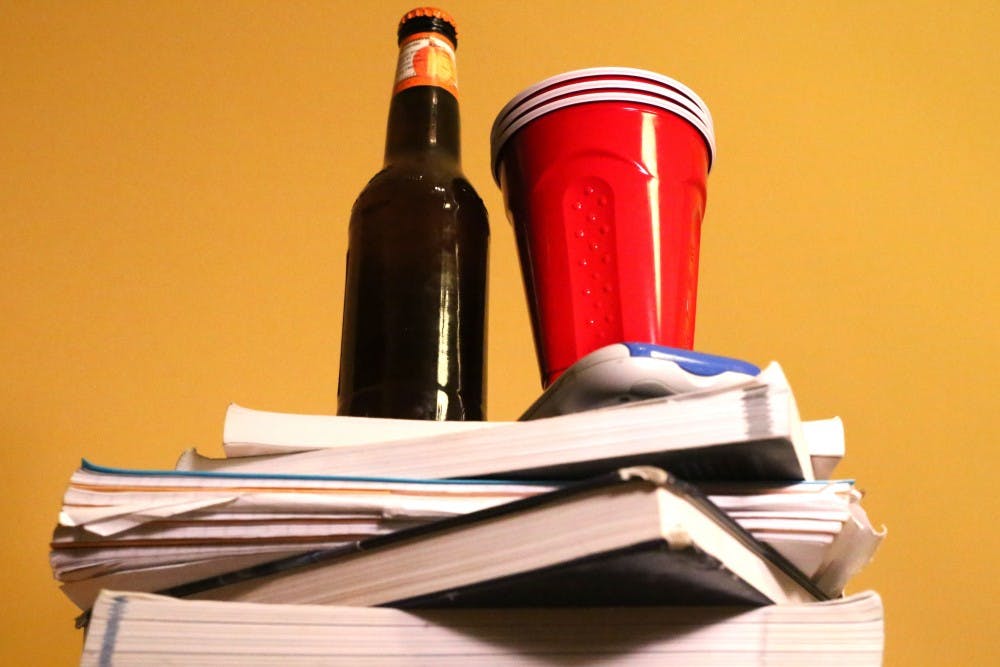I recently attended the Waste Management Phoenix Open and, besides being reminded that I can’t skate by without using sunblock, I was forced to reflect on drunkenness and its many wonders. Let me preface my next few claims by stating that I often reference the Bible for moral guidance, and that Jesus himself kept the drinks coming. By no means do I write this to deliver condemnation; rather I intend to provide my personal outlook on alcohol consumption in college, and the harm it can cause.
How often do we hear complaints that textbook prices are killing students’ bank accounts? According to the University of Pennsylvania, college students spend about $450 per year on books and twice that on alcohol. For many students, the direct monetary cost of alcohol contributes to decreasing college affordability. But it’s only $900 a year, and when college is upwards of $20,000 a year to attend, what’s the harm in spending $900 to have some fun?
I suspect the harm is more than we think.
I believe there is a notable similarity between success in college and lack of alcohol consumption. Take a look through the three pie charts below:
It first sticks out that 80 percent of college students consume alcohol, and 81 percent don’t graduate with a bachelor's degree in four years. Independently, both of those statistics are rather troubling. Furthermore, 70 percent of students graduate in debt. Am I making the claim that because those numbers align, that any form of alcohol consumption leads to failure in college? Of course not; the numbers are similar, but data sets are not directly related just because they are similar. There are many reasons for taking longer than four years to graduate and many for graduating in debt, and alcohol certainly doesn’t make up all of them.
I suspect, though, that alcohol consumption contributes to those numbers more than we students might think. If a student spends two, or sometimes three, nights a week drinking, he or she first incurs the cost of the drinks. Then he or she incurs the cost of the time spent drinking, time that could otherwise be spent working for pay, or studying to complete a college degree sooner, and that is where the real cost sets in.
Alcohol isn't the only reason 81 percent of students take longer to graduate, but it certainly affects many. If a student starts drinking every weekend and then begins skipping assignments and dropping classes, more semesters are needed for graduation. Then, the monetary cost of drinking goes up by the cost of tuition, which is upwards of $20,000, not $900. Those costs are extremely important to the 70 percent of students who graduate with debt.
Again, having a drink will not end anyone’s college career. That being said, there are costs involved that most students may not be considering. An older member of society, with a steady income and minimal debt, can easily afford to spend some weekends and some money on drinking alcohol. For a college student on the path towards that end of financial self-sustainability, alcohol consumption is more damaging than it is to adults who are financially stable, and it can at times be devastating.
Whether slow graduation rates and alcohol consumption are correlated or not, many college students could stand to benefit from limiting alcohol consumption until they finish a degree as quickly and inexpensively as possible. The time that we spend as college students having fun is important, and we should never do away with it completely, but we would be wise to keep it from becoming harmful.
Related Links:
Drunkorexia: Starving for a Drink
Man drinks two cans of beer, arrested while driving
Reach the columnist at gheiler@asu.edu or follow @heilergeorge on Twitter.
Editor’s note: The opinions presented in this column are the author’s and do not imply any endorsement from The State Press or its editors.
Want to join the conversation? Send an email to opiniondesk.statepress@gmail.com. Keep letters under 300 words and be sure to include your university affiliation. Anonymity will not be granted.
Like The State Press on Facebook and follow @statepress on Twitter.




